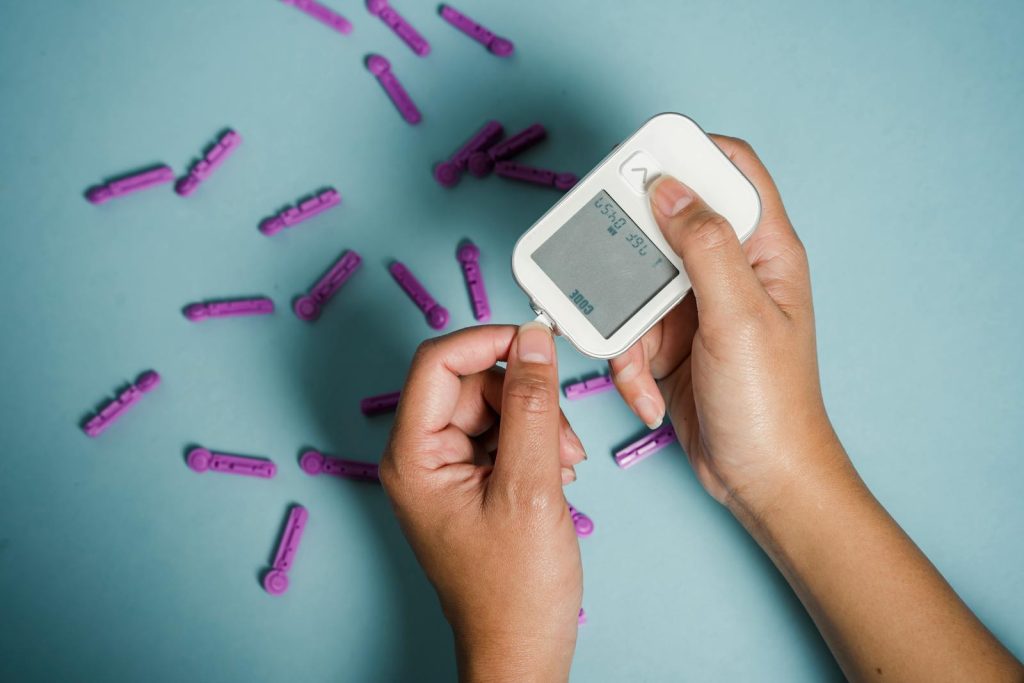Are you tired of feeling like a slave to your blood sugar levels? Constantly worrying about spikes and crashes can take a toll on your physical and emotional well-being. As someone who has struggled with managing my blood sugar, I understand the frustration and anxiety that comes with it. But there is hope.
The key lies in adopting a low carb diet, such as the popular and effective keto diet. By reducing your carbohydrate intake, you can regain control over your blood sugar and experience a range of health benefits. Whether you’re looking to manage diabetes or simply improve your overall well-being, a low carb diet can be the game-changer you’ve been searching for.
In this article, we will explore the link between a low carb diet and blood sugar control. You’ll discover the importance of managing your blood sugar levels, especially if you have diabetes, and how a low-carb diet can help you achieve optimal blood sugar regulation.
Get ready to take charge of your health and rediscover the freedom and peace of mind that comes with balanced blood sugar. Let’s dive into the world of low-carb living together and unlock a healthier, happier you.
Understanding the Basics
To effectively balance blood sugar levels on a low-carb diet, it is important to understand the basics of blood sugar regulation and the impact of carbohydrates on blood sugar levels.
The Impact of Carbohydrates on Blood Sugar
Carbohydrates play a significant role in influencing blood sugar levels. When you consume carbohydrates, they are broken down into glucose, which is then released into the bloodstream. This triggers the release of insulin, a hormone that helps transport glucose from the bloodstream into the cells for energy.
The rate at which carbohydrates affect blood sugar levels can vary depending on their glycemic index (GI). The glycemic index measures how quickly a carbohydrate-containing food raises blood sugar levels. High GI foods cause a rapid spike in blood sugar, while low GI foods cause a slower, more gradual increase.
Insulin resistance is another important factor to consider. Insulin resistance occurs when the cells in the body become less responsive to the effects of insulin, resulting in elevated blood sugar levels. This can increase the risk of developing type 2 diabetes.
The Role of Low Carb Diets in Managing Diabetes
Low-carb diets have gained popularity as a way to manage diabetes and balance blood sugar levels. By reducing carbohydrate intake, these diets help to lower blood sugar spikes and minimize the need for high amounts of insulin.
Carb counting is an essential practice for individuals with diabetes who follow a low-carb diet. It involves monitoring the grams of carbohydrates consumed in each meal and adjusting insulin doses accordingly to maintain stable blood sugar levels.
Low-carb diets can also be beneficial for athletes who need to manage their blood sugar levels during intense physical activity. Athletes can optimize their performance and prevent blood sugar fluctuations by consuming low-carbohydrate foods and strategically timing their meals.
Managing cravings and dealing with social situations can be challenging when following a low-carb diet. However, there are various strategies and low-carb food swaps that can help you satisfy cravings and enjoy social gatherings while still maintaining your blood sugar goals.
It is important to debunk common myths surrounding low-carb diets, such as the belief that they are unhealthy or restrictive. Low-carb diets can be nutritionally balanced and provide a wide variety of nutrients while effectively managing blood sugar levels.
You can successfully balance blood sugar levels on a low carb diet by understanding the impact of carbohydrates on blood sugar, managing insulin resistance, practising carb counting, and adopting strategies to handle cravings and social situations.
Practical Guide to a Low-Carb Diet
Determining Your Ideal Carb Intake:
When starting a low-carb diet, it’s essential to determine the ideal amount of carbohydrates you should consume based on your individual needs and goals. Factors such as your activity level, weight, and overall health should be taken into consideration.
Foods to Focus On:
When following a low carb diet, it’s important to focus on nutrient-rich foods that support overall health and blood sugar control. Here are some key food categories to prioritize:
- Nutritional Ketosis: The low-carb diet aims to put your body in a state of nutritional ketosis, where it starts using stored fat as fuel instead of carbohydrates. Foods that promote ketosis include avocados, coconut oil, and nuts.
- Healthy Fats: Include sources of healthy fats in your low-carb diet, such as olive oil, fatty fish like salmon, and grass-fed butter. These fats provide energy and help keep you feeling satisfied.
- Fiber-Rich Foods: Incorporate fiber rich foods like leafy greens, broccoli, and chia seeds into your low-carb meals. Fiber aids digestion promotes satiety, and helps regulate blood sugar levels.
- Low Carb Vegetables: Choose non-starchy vegetables like spinach, cauliflower, and bell peppers. These vegetables are low in carbohydrates and packed with essential vitamins and minerals.
Foods to Reduce or Eliminate:
To optimize blood sugar control, there are certain foods that you should reduce or eliminate from your low carb diet. These include:
- Sugar and Refined Carbohydrates: Minimize or avoid foods high in added sugars, such as sugary drinks, desserts, and processed snacks. Also, limit your intake of refined grains like white bread, pasta, and rice.
- High-Carb Fruits: While fruits are generally healthy, some are higher in carbohydrates than others. Limit your consumption of high-carb fruits like bananas, grapes, and dried fruits.
- Processed Foods: Processed foods often contain hidden carbohydrates and unhealthy fats. Avoid or minimize your intake of packaged snacks, fast food, and pre-made meals.
- Trans Fats: Trans fats found in fried foods, margarine, and packaged baked goods are harmful to heart health. Avoid foods that contain partially hydrogenated oils.
Implementing the Diet
Implementing a low-carb diet can be an effective way to balance your blood sugar levels and improve your overall health. In this section, we will provide you with practical tips to help you successfully implement a low-carb diet and maintain balanced blood sugar levels.
Sample Meal Plan for Balanced Blood Sugar
A well-structured meal plan can make sticking to a low-carb diet easier and more enjoyable. Here is a sample meal plan that promotes balanced blood sugar levels:
|
Meal |
Food |
Serving Size |
|
Breakfast |
Egg and vegetable omelette |
2 eggs, mixed vegetables |
|
Snack |
Blood sugar friendly snack |
Handful of mixed nuts and seeds |
|
Lunch |
Grilled chicken salad |
Grilled chicken breast, mixed greens, olive oil dressing |
|
Snack |
Blood sugar friendly snack |
Greek yogurt with berries |
|
Dinner |
Salmon with roasted vegetables |
Grilled salmon fillet, roasted low carb vegetables |
|
Snack |
Blood sugar friendly snack |
Carrot sticks with hummus |
Remember to tailor this meal plan to your specific dietary needs and preferences. It’s also important to practice portion control and monitor your blood sugar levels regularly to ensure the plan is working effectively for you.
Monitoring and Adjusting Your Diet
Monitoring your blood sugar levels and making adjustments to your diet are key aspects of maintaining balanced blood sugar on a low-carb diet. Here are some tips to help you with this process:
- Use a blood glucose monitor to regularly check your blood sugar levels.
- Keep a journal to track your meals, snacks, and blood sugar readings.
- Observe the signs of low blood sugar, such as dizziness, weakness, or irritability, and adjust your meal plan accordingly.
- Experiment with carb cycling – alternating high and low-carb days – to optimize blood sugar control.
- Explore low-carb recipes and incorporate them into your meal plan for variety and enjoyment.
- Incorporate intermittent fasting and physical activity into your routine to support metabolic health and blood sugar balance.
- Avoid sugar spikes by limiting your intake of processed foods and sugary drinks.
Remember, maintaining balanced blood sugar levels is not a one-size-fits-all approach. It’s important to listen to your body, seek guidance from healthcare professionals if needed, and make adjustments to your diet and lifestyle as necessary.
Beyond Diet: Holistic Management of Blood Sugar
Managing blood sugar levels goes beyond just following a low-carb diet. In addition to making dietary changes, several other strategies and techniques can help you achieve optimal blood sugar control. By incorporating these practices into your daily routine, you can further support your overall health and well-being.
Other Ways to Lower Blood Sugar Levels
In addition to a low-carb diet, various methods can help lower blood sugar levels:
- Supplements for low-carb diets: Certain supplements, such as chromium, magnesium, and alpha-lipoic acid, have been shown to support blood sugar regulation when combined with a healthy low-carb eating plan.
- Hydration and blood sugar: Staying hydrated is important for maintaining healthy blood sugar levels. Drinking an adequate amount of water throughout the day helps to prevent dehydration, which can impact blood sugar control.
- Mindful eating: Practicing mindful eating involves paying attention to physical hunger and fullness cues, eating slowly, and savoring each bite. By being more present during meals, you can make more conscious choices that support balanced blood sugar levels.
- Emotional eating and carbs: Emotional eating, which involves using food to pacify stress or other emotions, can lead to unhealthy carb consumption. Implementing stress management techniques and finding alternative ways to cope with emotions can help prevent emotional eating and stabilize blood sugar.
- Blood sugar and sleep: Lack of sleep can disrupt blood sugar control and lead to insulin resistance. Prioritize getting enough quality sleep each night to support optimal blood sugar management.
- Continuous glucose monitoring: Continuous glucose monitoring devices provide real-time information about your blood sugar levels. By tracking and analyzing this data, you can make more informed decisions about your diet and lifestyle to maintain stable blood sugar levels.
Consulting with Healthcare Professionals
Consult healthcare professionals for expert guidance on blood sugar management. They offer personalized strategies, monitor progress, and address concerns, ensuring a comprehensive approach to control.
|
Method |
Description |
|
Supplements for low-carb diets |
Certain supplements, such as chromium, magnesium, and alpha-lipoic acid, can support blood sugar regulation. |
|
Hydration and blood sugar |
Staying hydrated helps maintain healthy blood sugar levels. |
|
Mindful eating |
Practising mindful eating involves being present during meals and making conscious choices. |
|
Emotional eating and carbs |
Avoiding emotional eating and finding alternative coping mechanisms can stabilize blood sugar. |
|
Blood sugar and sleep |
Getting enough quality sleep supports optimal blood sugar control. |
|
Continuous glucose monitoring |
Tracking blood sugar levels in real time allows for informed decisions and adjustments. |
Conclusion
In conclusion, adopting a low-carb diet can effectively regulate blood sugar levels and improve overall health, especially for individuals with diabetes. However, it is crucial to approach this lifestyle change sustainably. Prioritize consuming nutrient-dense foods and incorporating a diverse range of low-carb options in your meals to maintain stable blood sugar levels and meet your body’s essential nutrient needs.





